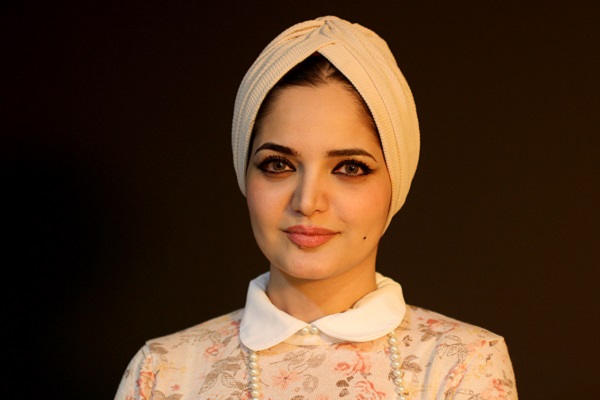Interview with shortlisted author Shahad Al Rawi
16/04/2018

When did you begin writing Baghdad Clock and where did the inspiration for it come from?
I don’t remember when the novel began to take shape in my mind and when it became ready to write. Every time I looked back to my childhood, an inner voice called me to write, but I would always put it off, like someone trying to avoid a task. I am naturally lazy and not good at starting things. It so happened that one day in Autumn 2014, I decided to sit down and begin writing. I didn’t have a ready-made idea about the type of adventure on which I was embarking. Writing the beginning was easy and then the events drew me on, as though a barrier had been broken down between me and a novel already in existence in some place or other, and I just had to pull it down onto paper. Do you call this inspiration?
Did it take a long time to write and where were you when you finished it?
It took more than a year and a half and I wrote it between Dubai and Sulaymaniyah in Iraq.
Why did you choose a young girl as your main character and narrator?
We come into this life as children, and our first experience of wonder comes from there. I personally count my childhood as the place where I feel most secure. I used the naïve language of this young girl and from her childish chatter created the neighbourhood, people, imaginary things and dreams. On her lips were the key questions on which the novel is built.
I made the reader believe that he is really listening to a young girl who doesn’t want to stop talking, who mixes fact and fantasy and sees the place where she lives as a ship, then talks to the birds and cats. She invents a captain and chats to him, so that we will listen to him. Recalling childhood and going there is a difficult task which exhausted me personally, and it confused many readers who came to the novel with different expectations. This young girl prepares the way for all the strange happenings which occur in the second part, and makes them credible. The whole of the chapter of the future could not have come about, were it not for this cunning naivety.

© Khéridine Mabrouk / IPAF
The main character says: “Where has that old clarity gone…In childhood, we see things as they are, in their intense clarity, we experience them as real things” (page 192). What is the importance of childhood in the novel?
Thank you for pausing at this paragraph, which might seem an unimportant part of the novel. I took the heading of the first section of the book from this sentence. This question is something which has preoccupied me for a long time. I have often thought about the relationship between the words we say and the things before our eyes. In our childhood, when we are told that this is a “tree”, we feel the tree is powerfully present and real, as though we saw, touched, smelled and tasted it, and heard its leaves rustling, all at once. Perhaps there is another sense whose name we do not know, which strongly impresses the reality of the tree upon us. When we grow older and our ambiguous relationship with language is formed through the school curriculum, words become more real than the things themselves. We are told: “put ‘tree’ in a useful sentence”. At this point, the “useful sentence” becomes more important than the actual tree. For this reason, I say in another part of the novel that names lose their value when we place them in a useful sentence. Precisely for this reason, returning to childhood is important, so we can give fresh consideration to the essence of things. Because of repetition in language, we have distanced ourselves from the environment in which we live. We have begun to live in a world of words.
In the novel we find fear of the past being erased and of surprises brought by the future: “For those who fear the future, the past is a merciful cave of refuge where people flee from the harshness of the present” (page 152). What is the role of memory in the novel and society in general?
As I mention in one paragraph in the novel, everything which has happened in the past has really happened, so it does not threaten us with any surprises. It is a used-up, safe time. In circumstances like ours, the future holds more frightening things than it does good news. Because of the large number of events we have experienced which do not bring joy, one after the other, we have little trust in the future. In the life of every generation, there is a time they call a golden time, not that it necessarily was, but at least they lived their lives, maybe without bearing responsibilities. The harsher life becomes, the more we flee to the past, with our memories. There is an obscure mechanism in these memories which creates from them a montage, where nasty things have been removed and everything is painted in delightful colours. This is a cinematic trick, a wonderful one which we live as reality. I am talking here about personal memory. I don’t know anything about the work of collective memory. I don’t know why, for example, Iraqis speak of the 1970s as a golden time for them, or the reason for their obscure yearning for the time of the monarchy or other times.
“Dialect is the moral depository and rudder for people. When we abandon it, we lose ourselves and our emotions are disfigured” (page 158). Can you comment on this?
We often hear the expression “the mother tongue” of someone. Through this language, an individual develops his awareness of the world and his view of existence. This is the language we call “dialect”. In it is deposited our initial knowledge and system of values and culture in its daily meaning. It is a livelier language and more capable of developing and growing than the official language which we learn at school, since dialect creates alternative ways of saying things every day. It invents flexible terminology which allows us to communicate in a very fluid way. Through it, societies express their moral system and values. We live each day with our dialect and dream in it too.
Is the character of Amu Shawqat based on someone you knew?
Amu Shawqat is perhaps a composite of a number of people I have met. Or maybe he is how I imagine the generation of fathers I met in my childhood. He is a typical Iraqi character whom you would meet a lot in Baghdad, for example. He may not be a particular person in reality and he doesn’t remind me of any one person, but I know him well and love him, as though he was not a mere character in a novel. When I finished writing the novel and shut the computer, I felt as if I had left my true family, and Amu Shawqat was the person I missed the most. I miss him even at this moment. I hope to meet him by chance in real life and to hold out my hand so he can imprint on it his [imaginary] clock. I know him well, believe me, to the extent that I truly miss him.
What were you doing when the shortlist was announced and what was your reaction to the news?
I was at home with my mother and sister and a group of female friends. We were of course waiting for the moment when the shortlist would be announced. The minutes passed slowly. I was overwhelmed by a strong feeling that Baghdad Clock must appear on the list. I wanted to see the joy on my mother’s face. I expected to see her tears, which come with her rare joys. It happened as I expected. I saw happiness mingled with tears upon her face, an uncontainable joy. It was a wonderful day in my life.
